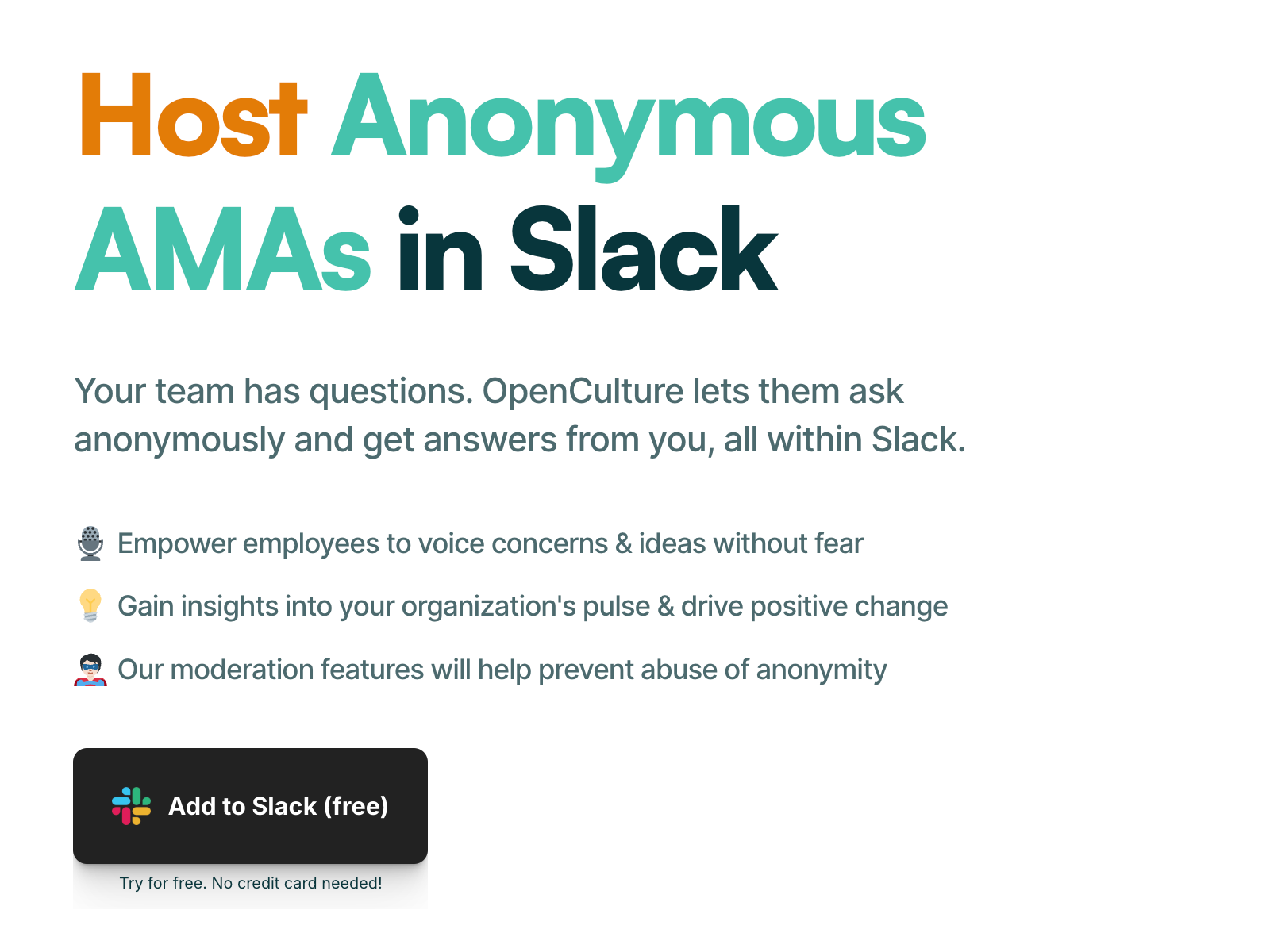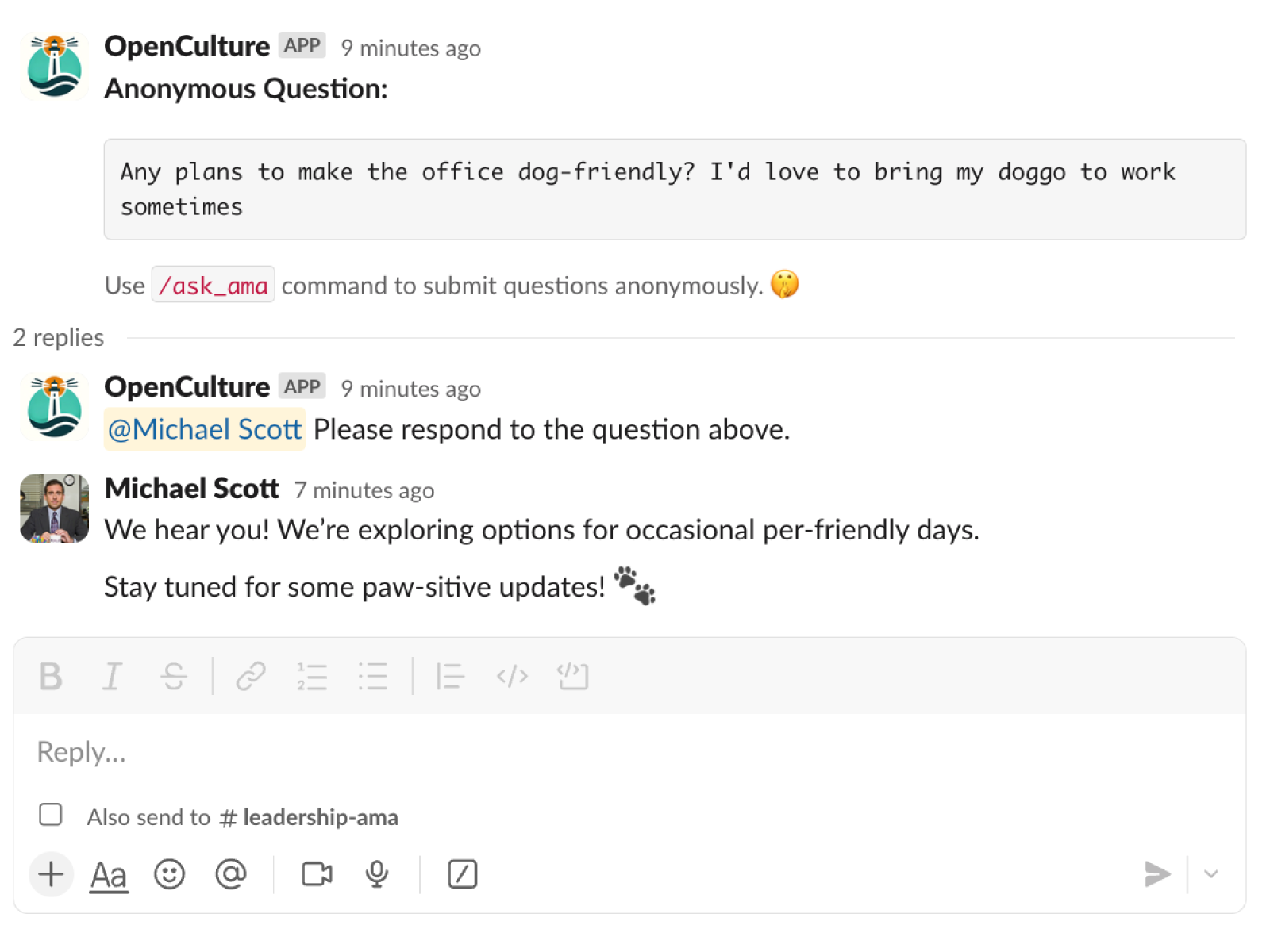OpenCulture : Host Anonymous AMA sessions directly in your Slack workspace

OpenCulture: in summary
OpenCulture is a Slack integration designed to facilitate anonymous question-and-answer sessions within teams and organizations. Its primary goal is to foster transparent communication, enabling employees to voice concerns, share feedback, and ask leadership questions without fear of judgment or reprisal. The tool combines anonymity, moderation controls, and integration within Slack workflows to create a space where open conversations drive engagement and trust.
What are the main features of OpenCulture?
Anonymous Q&A Across Slack Channels
One of OpenCulture's core features is its ability to enable anonymous Q&A in any Slack channel through a simple command. This functionality can be implemented in both public and private channels, ensuring flexibility across team sizes and structures.
- Accessible via the /enable_ama command.
- Supports both public and private Slack channels.
- Adaptable for company-wide channels (e.g., #leadership-ama) or team-specific channels (e.g., #engineering-ama, #marketing-ama).
By democratizing access to leadership through anonymity, OpenCulture reduces barriers for employees hesitant to speak up in traditional settings.
Anonymous Question Submission
Employees can submit questions anonymously using the /ask_ama command. This simplicity encourages participation from team members who might otherwise hesitate to speak in open forums.
- Simple command-based submission process.
- Assurance of complete anonymity for every query.
- Suitable for team-level discussions or company-wide AMAs.
The streamlined approach ensures anonymity remains intact while promoting candid conversations.
Duplicate Question Detection
To prevent redundancy and optimize leadership's time, OpenCulture identifies when a question has already been asked. Employees are prompted to review existing responses before submitting their query.
- Automated detection of duplicate or similar questions.
- Suggestions for reviewing prior responses before resubmission.
- Reduces repetitive interactions and focuses discussions on unique insights.
This feature is particularly useful in large-scale AMAs where repeated questions can disrupt the flow of meaningful conversations.
Moderation Tools for Controlled Discussions
Balancing anonymity with accountability is a challenge in anonymous Q&A sessions. OpenCulture addresses this through a combination of AI-powered moderation and manual review by designated moderators.
- AI filters inappropriate or off-topic questions automatically.
- Manual moderation allows human oversight of pending queries.
- Admins can approve or reject questions before they appear in public threads.
These moderation tools ensure discussions remain constructive and focused on relevant topics while minimizing misuse of anonymity.
Threaded Discussions for Clarity
Once questions are approved, they are posted in designated channels as threaded Slack messages. This keeps communication organized and makes it easy for leadership to respond directly.
- Approved questions are posted in dedicated threads.
- Leadership can respond without cluttering the main channel.
- Conversations remain transparent and easy to follow.
This design aligns with Slack's native workflow, reducing friction for both employees and leadership.
Key Use Cases for OpenCulture
Company-Wide AMAs
OpenCulture enables organization-wide AMAs, where employees can ask senior leadership direct questions. This setting is ideal for addressing company updates, strategic goals, or broader cultural discussions.
Team-Level AMAs
Smaller, team-specific sessions (e.g., Engineering, Marketing) offer tailored opportunities for employees to address team-related challenges, clarify objectives, and voice concerns.
New Hire Q&A Sessions
Anonymous Q&A during onboarding allows new employees to ask questions about policies, processes, and team culture without fear of appearing uninformed.
Suggestion Box
A dedicated suggestion channel empowers employees to contribute feedback and propose ideas for improving workflows, culture, and operations.
The Value Proposition of OpenCulture
Enhancing Psychological Safety
Research consistently highlights psychological safety as a key factor in team performance. OpenCulture aligns with findings from Google's Project Aristotle, emphasizing that teams where members feel safe to speak up are more successful.
Employee Morale and Engagement
Studies, such as Salesforce's research on employee empowerment, indicate that employees who feel heard are significantly more engaged and productive. OpenCulture facilitates this by lowering the barriers to open communication.
Retention and Satisfaction
Organizational behavior research suggests that employees who cannot voice concerns are more likely to disengage or consider leaving their roles. Anonymous communication tools can address these risks by giving employees a safe space to share their perspectives.
Limitations and Considerations
While OpenCulture offers robust anonymity and moderation tools, its effectiveness depends on organizational culture and leadership responsiveness. Anonymous tools can sometimes lead to misuse if moderation policies are not enforced consistently. Additionally, leadership must demonstrate commitment to acting on feedback to maintain trust.
Pricing Overview
- Free Trial: 14-day trial with a limit of 100 questions.
- Startups (<1000 members): $50/month with unlimited users and questions.
- Enterprise (>1000 members): $100/month with unlimited users and questions.
The pricing structure reflects scalability, making it accessible for smaller teams while providing robust functionality for larger organizations.
Privacy and Data Security
OpenCulture emphasizes privacy-first principles. The integration cannot read messages in Slack channels, ensuring discussions remain private and secure.
Conclusion
OpenCulture addresses a critical gap in organizational communication by offering a structured, anonymous Q&A platform within Slack. It combines anonymity, moderation, and workflow integration to create a tool that supports transparent communication, psychological safety, and actionable insights.
However, its success ultimately depends on leadership engagement and organizational readiness to embrace open communication channels. For companies committed to fostering trust and dialogue, OpenCulture represents a valuable addition to their internal communication toolkit.
 OpenCulture - Screenshot 1
OpenCulture - Screenshot 1 
OpenCulture: its rates
standard
$50.00
/month /user
Clients alternatives to OpenCulture

Streamline internal communication with intuitive software that connects teams and increases productivity.
See more details See less details
With Banana Content, employees can collaborate in real-time, share documents, and receive notifications for important updates. Say goodbye to cluttered inboxes and hello to clear communication.
Read our analysis about Banana Content
Streamline your team's communication with this cloud-based software. Features include video conferencing, instant messaging, and call forwarding.
See more details See less details
With Placetel's internal communication software, your team can easily collaborate and stay connected from anywhere. The software's intuitive interface allows for seamless video conferencing, instant messaging, and call forwarding, making it an essential tool for any modern workplace.
Read our analysis about Placetel
Boost productivity with this internal communication software that streamlines collaboration and knowledge sharing.
See more details See less details
With features like real-time chat, document collaboration, and a centralized news feed, this software makes it easy for teams to stay connected and informed. Plus, its intuitive interface ensures quick adoption and increased productivity.
Read our analysis about HappeoBenefits of Happeo
Centralises your productivity tools
Focuses on social communication and collaboration
Incorporates all G Suite Tools
Appvizer Community Reviews (0) The reviews left on Appvizer are verified by our team to ensure the authenticity of their submitters.
Write a review No reviews, be the first to submit yours.
